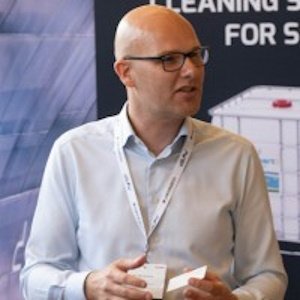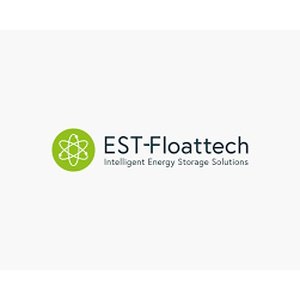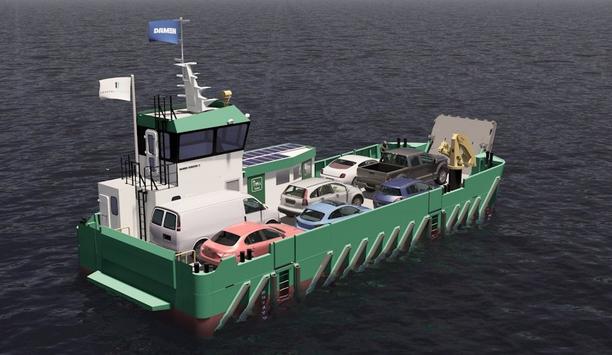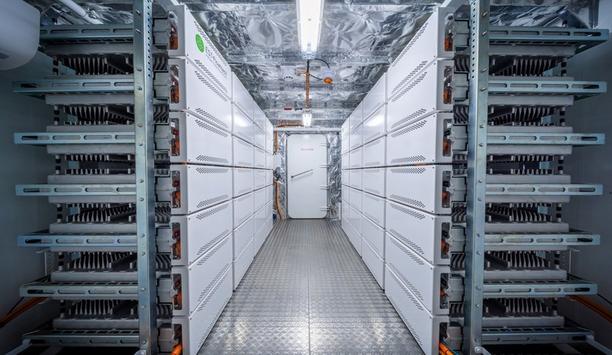EST-Floattech - Experts & Thought Leaders
Latest EST-Floattech news & announcements
Coastal Workboats, a renowned name in the maritime industry for its commitment to sustainability, will collaborate with EST-Floattech, a pioneering provider of energy storage solutions for the maritime sector. EST-Floattech will be providing the battery system for the purpose-built Electric-Landing Utility Vessel (E-LUV) to be built at Coastal Workboats' new yard Stornoway and the Shore-based Power Supply System (SPSS). The collaboration with Coastal Workboats Scotland marks a significant step towards lowering emissions in the UK’s maritime industry with EST-Floattechs technology. This collaboration is realized due to Coastal Workboats receiving a £6 million (€7 million) grant to demonstrate the UK's first commercial electric workboat and charging station. This grant, provided by the Clean Maritime Demonstration Competition (CMDC), underscores the industry's recognition of the pressing need for cleaner, greener maritime operations and will boast the usage of electric workboats in a commercial environment. Capabilities of energy storage solutions The vessel that will be built, the E-LUV, is set to be the UK's first commercial electric workboat The vessel that will be built, the E-LUV, is set to be the UK's first commercial electric workboat. This innovative vessel, a Ro-Ro and dry cargo transportation ferry, will be equipped with 2400 kWh of EST-Floattech’s Octopus High Energy battery system. The system will be placed as two independent battery systems on board, power a range of equipment, and be used for fully electric sailing. Starting for demonstration purposes in the Shetland Isles in a short trial, the E-LUV will be operating between West Burrafirth and Papa Stour. The route takes about 45 minutes, twice per day and five days per week, while showcasing the capabilities of energy storage solutions in maritime applications. Coastal Workboats’ E-LUV vessel Secondly, EST-Floattech will supply 1.200 kWh of the Octopus High Energy battery system, to be placed in a 20-foot container that will support the charging of Coastal Workboats’ E-LUV vessel. It is also possible to place the containerized energy storage solution on board as a range extender. We will be collaborating with MJR Power & Automation for the system integration and the entire system will be placed inside the container by Renew Marine Ltd. Enhanced safety, less maintenance E-LUV will adhere to Bureau Veritas-type standards, ensuring top-notch safety and quality The E-LUV will adhere to Bureau Veritas classification standards, ensuring top-notch safety and quality. The battery system will not only be safer, but it will also need less maintenance. This Ro-Ro and dry cargo transportation ferry is set to become a new standard for emission-free voyages. This contract is a significant achievement for Coastal Workboats, a small, family-run yard, and also for EST-Floattech. Coastal Workboats’ Chief Engineering Manager Luke Parnell said: “Our attraction to the Octopus Series quite simply comes down to safety. EST-Floattech has produced a class-approved product that brings to market a level of safety unseen previously. In particular, the passive nature of the heat dissipation system represents a marked step forward in safety, particularly for an application in the marine environment. Given our primary concern is safety above all, the Octopus was the perfect choice for us.” UK's environmental targets Jelle Meindertsma, Sales Manager at EST-Floattech, states, "We are proud to be contributing to lowering emissions in the maritime industry in the UK, working hand in hand with Coastal Workboats to bring sustainable, high-performance energy solutions to the forefront. Our collaboration on the E-LUV is a testament to our shared commitment towards a more environmentally responsible maritime future." This collaboration between Coastal Workboats and EST-Floattech marks a significant stride towards achieving the UK's environmental targets and demonstrates the power of innovation in the maritime sector. Clean Maritime Demonstration Competition Projects will take place in multiple locations around the UK from as far north as the Shetland Isles This project, the fully electric inter-island workboat demonstration project (including the E-LUV), is part of the Clean Maritime Demonstration Competition Round 3 (CMDC3), which was announced in September 2022, funded by the UK Government and delivered in partnership with Innovate UK. As part of the CMDC3, the Department allocated £60m to 19 flagship projects supported by 92 UK organizations to deliver real-world demonstration R&D projects in clean maritime solutions. Projects will take place in multiple locations around the UK from as far north as the Shetland Isles and as far south as Cornwall. UK SHORE The CMDC3 is part of the UK Shipping Office for Reducing Emission’s (UK SHORE) flagship multi-year CMDC program. In March 2022, the Department announced the biggest government investment ever in the UK commercial maritime sector, allocating £206m to UK SHORE, a new division within the Department for Transport focused on decarbonizing the maritime sector. UK SHORE is delivering a suite of interventions throughout 2022-2025 aimed at accelerating the design, manufacture, and operation of UK-made clean maritime technologies and unlocking an industry-led transition to Net Zero.
Developer of maritime battery systems - EST-Floattech receives an investment of 4 million euros from the Energy Transition Fund Rotterdam and existing shareholders Rotterdam Port Fund, PDENH, Ponooc, and Yard Energy. This was announced by Chantal Zeegers, the Alderman for Climate, Building, and Housing in Rotterdam. The ‘Energietransitiefonds Rotterdam’ is the investment fund of the municipality of Rotterdam. Lithium-ion battery systems EST-Floattech develops and produces high-quality lithium-ion battery systems for electric and hybrid propulsion of inland vessels, ferries, yachts, and more. Combined with in-house-developed software, the systems provide significant improvements when it comes to CO2 emissions, fuel costs, noise pollution, and air quality. Energy Transition Fund Rotterdam is investing 3 million euros, the fund's first investment in maritime battery systems. The existing shareholders are jointly investing 1 million euros. An example of cooperation in the maritime ecosystem Rotterdam Port Fund is a private investment fund focused on innovation in the port sector As fund manager of the Ethenergy Transition Fund Rotterdam and investor in Rotterdam Port Fund, InnovationQuarter is closely involved in the investment. Rotterdam Port Fund is a private investment fund focused on innovation in the port sector. The fund played an important role in the realization of the transaction, which exemplifies the close cooperation within the South Holland maritime cluster. EST-Floattech contributes to this ecosystem through their many Rotterdam customers, including Damen and KOTUG. Innovation in electrification aligns with both the Regional Maritime Agenda 2030 and the Regional Energy Strategy for Rotterdam/ The Hague. Great societal importance The electrification of shipping has great social importance. Inland and maritime shipping together account for 16.5% of the Netherlands' CO2 emissions. Moreover, goods transported by water will increase significantly in the coming years. The EU is aiming for a 50% increase in transport via inland waterways and shorter sea routes by 2050 compared to 2015. For international shipping, volume growth of over 200% is even expected between 2023 and 2050. Currently, only 1% of the global fleet is electrified, and the sector needs to catch up tremendously to achieve net zero by 2050. Increased fleet electrification The increasing costs associated with CO2 emissions make electrification increasingly interesting Since January 1st, 2024, the European CO2 emissions trading system EU-ETS has been in place for larger ships, with smaller ships expected to follow in 2026. The increasing costs associated with CO2 emissions make electrification increasingly interesting within a rapidly growing market. As the second-largest player, there is a great opportunity here for EST-Floattech. Octopus Series battery system Lithium-ion batteries combine low weight with high energy density, low self-discharge, and long life. EST-Floattech's battery management system monitors charge status, discharge status, temperature, and other parameters to ensure efficient and safe battery operation. Fire safety is critical on ships. At EST-Floattech, safety is the highest priority, and the new Octopus Series battery system has been certified by classification bureaus DNV, Lloyd's Register, and Bureau Veritas. International and national growth EST-Floattech also plans to focus on larger vessels in the future For the aluminum housing, insulation material, electronic components, and the racks in which the battery cells are installed, EST-Floattech is working with Dutch partners. The investment will allow EST-Floattech to continue to grow nationally and internationally. The company is focusing on market leadership in Northwest Europe and is working with battery manufacturer DuraPower for access to Asia and Oceania. EST-Floattech also plans to focus on larger vessels in the future. Innovation and sustainable energy Joep Gorgels, CFO and CBDO of EST-Floattech, "The investment of Energietransitiefonds Rotterdam and the current shareholders in EST-Floattech not only brings new capital, which helps us take the next step towards growth, it also shows that the Netherlands believes in the power of innovation and sustainable energy." Joep Gorgels adds, "With Innovation Quarter, we have added a new partner, and together with Ponooc, Yard Energy, Rotterdam Port Fund, and PDENH, we continue to build a future in which we contribute to making the maritime industry more sustainable." Energy transition Chantal Zeegers, the Alderman for Climate, Building, and Housing in Rotterdam, "Rotterdam attracts companies that dare to invest in the energy transition. We are seeing this with EST-Floattech." Chantal Zeegers adds, "Their innovative battery technology for ships contributes to the reduction of CO2 emissions in a sector where there is much to be gained. It is incredibly nice that through the Energietransitiefonds Rotterdam, we can support companies like this."
Dutch energy storage systems provider EST-Floattech has been contracted to provide battery systems for the fully electric carbon-neutral event vessel. The vessel Oceandiva London, which will enter service this summer, features several industry firsts. It is 86 meters long and 17 meters wide. What little CO2 the vessel might release, will be balanced by the same amount being absorbed from the atmosphere. The batteries are charged by both green fast-charging shore power and onboard solar panels, with a biofuel generator as backup for longer excursions. NZMS Program Green Orca system is made up of two lithium battery packs with a total capacity of 2.2 MWh The Green Orca system is made up of two lithium battery packs with a total capacity of 2.2 MWh. The ship is part of the Net Zero Marine Services (NZMS) program to decarbonize London’s river. The new event vessel was designed for the British events company Smart Group by Amsterdam-based company Oceandiva – which operates similar ships in the Netherlands, Germany, and Belgium. The vessel was built by VEKA Group of Werkendam, the Netherlands. Electrical system integrator Werkina Werkendam commissioned EST-Floatech for the energy solution. “We are delighted to contribute to the world’s first carbon-neutral event vessel. The same goes for our cooperation with electrical system integrator Werkina, an important and valued new business partner with very strong references,” Walter van der Pennen, EST’s Commercial Director noted.





